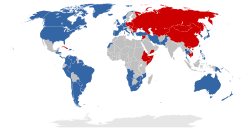Western Bloc
This article needs additional citations for verification. (June 2014) |


The Western Bloc, also known as the Free Bloc, the Capitalist Bloc, the American Bloc, and the NATO Bloc, was a coalition of countries that were officially allied with the United States during the Cold War of 1947–1991. It was spearheaded by the member states of NATO, but also included countries that advocated democracy, anti-communism and anti-socialism, and likewise were opposed to the Soviet Union and the Warsaw Pact. The term was used to distinguish this anti-Soviet grouping from its pro-Soviet counterpart: the Eastern Bloc. Throughout the protracted period marked by Soviet–American tensions, the governments and the press of the Western Bloc were more inclined to refer to themselves as the Free World or the First World, whereas the Eastern Bloc was often referred to as the "Communist World" or more formally as the "Second World".
1947–1991 Western Bloc associations
- Belgium*
- Canada*
- Denmark*
- France*
- FR Germany (1955–1990)
- Greece (from 1952)
- Iceland*
- Italy*
- Luxembourg*
- Netherlands*
- Norway*
- Portugal*
- Spain (from 1982)
- Turkey (from 1952)
- United Kingdom*
- United States*
* Indicates founding member state
- China (from 1961)
- Kampuchea (until 1978)
- Romania[a] (from 1964)
- Yugoslavia (from 1949)
METO, Baghdad Pact, CENTO (until 1979)
- Iran (until 1979)
- Iraq (until 1958)
- Pakistan (until 1979)
- Turkey (until 1979)
- United Kingdom (until 1979)
- Argentina
- Bahamas (from 1982)
- Bolivia (until 2005)
- Brazil
- Chile
- Colombia
- Costa Rica
- Cuba (1902–1959) (until 1959)
- Dominican Republic (until 1990)
- Ecuador (until 2012)
- El Salvador
- Guatemala
- Honduras
- Mexico
- Nicaragua (until 1979)
- Panama
- Paraguay
- Peru
- Trinidad and Tobago (from 1967)
- United States
- Uruguay
- Venezuela (until 1999, rejoined 2019 by Juan Guaidó)
SEATO (until 1977)

- Australia (until 1977)
- Cambodia (until 1956)
- Khmer Republic (1970–1975)
- France (until 1965)
- Laos (until 1975)
- New Zealand (until 1977)
- Pakistan (until 1972)
- Philippines (until 1977)
- Republic of Vietnam (until 1975)
- Thailand (until 1977)
- United Kingdom (until 1977)
- United States (until 1977)
Middle East/North Africa Region
- Afghanistan (2001–2021)
- Bahrain
- Egypt (from 1979)
- Iran (until 1979)
- Iraq (until 1990)
- Israel
- Jordan
- Kuwait
- Lebanon
- Libya (before 1969, from 2011)
- Morocco
- Oman
- Qatar
- Saudi Arabia
- Somalia (from 1977)
- Sudan (1971-1985, 2019-2021)
- Syrian opposition
- Tunisia
- Turkey (until 2009)
- United Arab Emirates
- Yemen (Hadi government)
- North Yemen (1962–1990)
Asia, Southeast Asian and Oceania Partners
- Japan
- South Korea
- Taiwan
- Australia
- New Zealand
- India
- Bhutan
- Indonesia
- Philippines
- Thailand
- Malaysia
- Singapore
- Brunei (from 1984)
- Vietnam (from 1995)
- Georgia
- Ukraine
- Uzbekistan (1999–2005)
- Azerbaijan
- Moldova
Others
- Belarus (1991–1994)
- Bosnia and Herzegovina
- Cyprus
- Ethiopia (before 1974)
- Khmer Republic (1970–1975)
- Kosovo
- Russia (1991–1999)
- South Africa
- West Berlin
- Zaire
Post-1991 Western-aligned associations
- Albania (from 2009)
- Belgium*
- Bulgaria (from 2004)
- Canada*
- Croatia (from 2009)
- Czech Republic (from 1999)
- Denmark*
- Estonia (from 2004)
- France*
- Germany*
- Greece*
- Hungary (from 1999)
- Iceland*
- Italy*
- Latvia (from 2004)
- Lithuania (from 2004)
- Luxembourg*
- Montenegro (from 2017)
- Netherlands*
- North Macedonia (from 2020)
- Norway*
- Poland (from 1999)
- Portugal*
- Romania (from 2004)
- Slovakia (from 2004)
- Slovenia (from 2004)
- Spain*
- Turkey*
- United Kingdom*
- United States*
* Indicates pre-1991 member state
Major non-NATO ally (MNNA)
- Australia (from 1987)
- Egypt (from 1987)
- Israel (from 1987)
- Japan (from 1987)
- South Korea (from 1987)
- Jordan (from 1996)
- New Zealand (from 1997)
- Argentina (from 1998)
- Bahrain (from 2002)
- Philippines (from 2003)
- Thailand (from 2003)
- Taiwan (de facto) (from 2003)
- Kuwait (from 2004)
- Morocco (from 2004)
- Pakistan (from 2004)
- IR Afghanistan (2012–2021)
- Tunisia (from 2015)
- Brazil (from 2019)
- Colombia (from 2022)
- Qatar (from 2022)
Middle Eastern Partners
Asia, South East Asian and Oceania Partners
Inter-American Partners
Others
- Bosnia and Herzegovina
- Cyprus
- Finland (from 2022)
- Kosovo
- Sweden (from 2022)
- South Africa
- Austria
- Ireland
- Malta
See also
Notes
Sources
- Matloff, Maurice. Makers of Modern Strategy. Ed. Peter Paret. Princeton: Princeton UP, 1971. 702.
- Kissinger, Henry. Diplomacy. New York: Simon & Schuster, 1994. 447,454.
- Lewkowicz, Nicolas. The United States, the Soviet Union and the Geopolitical Implications of the Origins of the Cold War New York and London: Anthem Press, 2018.
